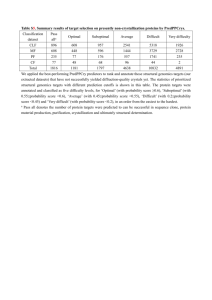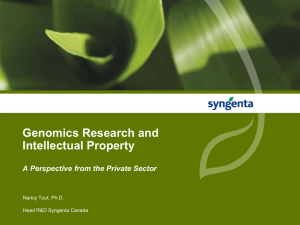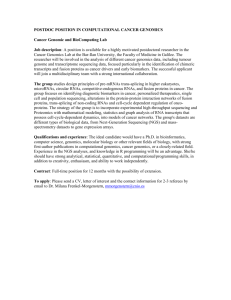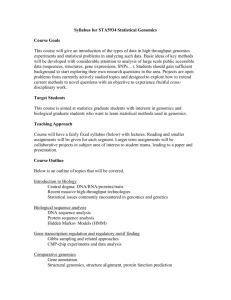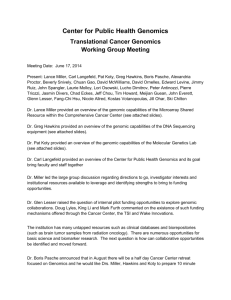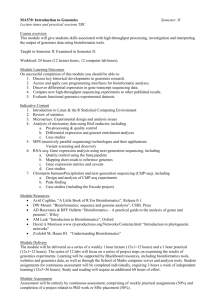Livestock Genomics in Alberta: Economic, Environmental, Ethical
advertisement
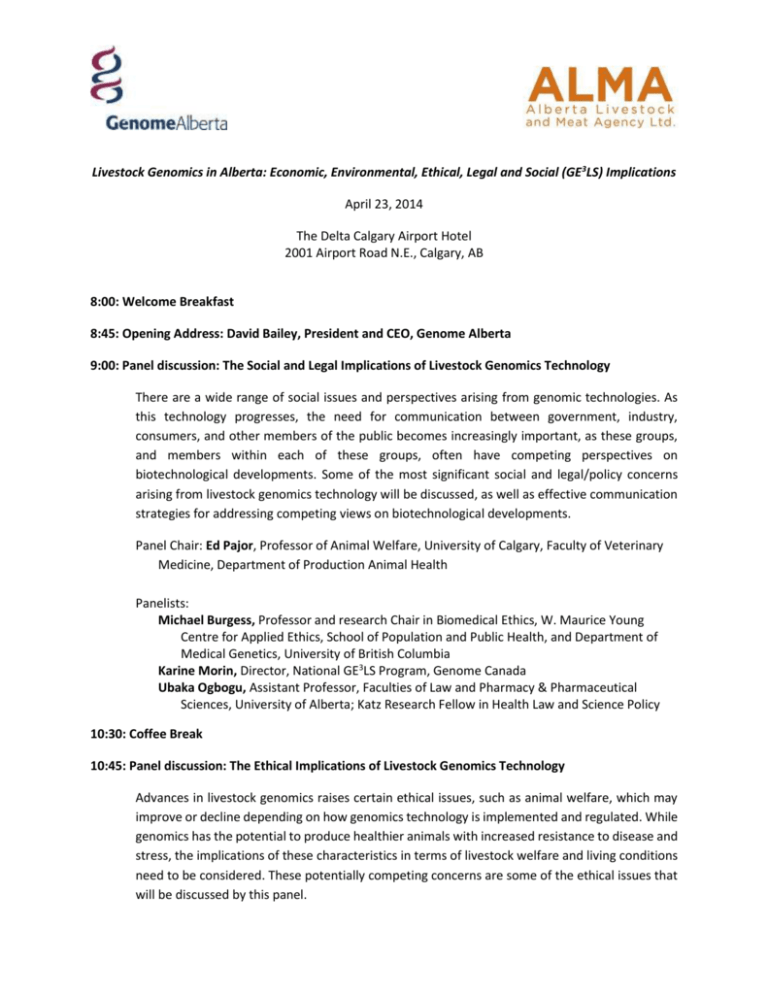
Livestock Genomics in Alberta: Economic, Environmental, Ethical, Legal and Social (GE 3LS) Implications April 23, 2014 The Delta Calgary Airport Hotel 2001 Airport Road N.E., Calgary, AB 8:00: Welcome Breakfast 8:45: Opening Address: David Bailey, President and CEO, Genome Alberta 9:00: Panel discussion: The Social and Legal Implications of Livestock Genomics Technology There are a wide range of social issues and perspectives arising from genomic technologies. As this technology progresses, the need for communication between government, industry, consumers, and other members of the public becomes increasingly important, as these groups, and members within each of these groups, often have competing perspectives on biotechnological developments. Some of the most significant social and legal/policy concerns arising from livestock genomics technology will be discussed, as well as effective communication strategies for addressing competing views on biotechnological developments. Panel Chair: Ed Pajor, Professor of Animal Welfare, University of Calgary, Faculty of Veterinary Medicine, Department of Production Animal Health Panelists: Michael Burgess, Professor and research Chair in Biomedical Ethics, W. Maurice Young Centre for Applied Ethics, School of Population and Public Health, and Department of Medical Genetics, University of British Columbia Karine Morin, Director, National GE3LS Program, Genome Canada Ubaka Ogbogu, Assistant Professor, Faculties of Law and Pharmacy & Pharmaceutical Sciences, University of Alberta; Katz Research Fellow in Health Law and Science Policy 10:30: Coffee Break 10:45: Panel discussion: The Ethical Implications of Livestock Genomics Technology Advances in livestock genomics raises certain ethical issues, such as animal welfare, which may improve or decline depending on how genomics technology is implemented and regulated. While genomics has the potential to produce healthier animals with increased resistance to disease and stress, the implications of these characteristics in terms of livestock welfare and living conditions need to be considered. These potentially competing concerns are some of the ethical issues that will be discussed by this panel. Panel Chair: Karen Schwartzkopf-Genswein, Research scientist, Agriculture and Agri-Food Canada Panelists: Andrew Kernohan, Adjunct Professor, Dalhousie University, Department of Philosophy Joe Stookey, Professor, Animal Behaviour, University of Saskatchewan 12:15: Lunch 1:15: Panel discussion: The Environmental Implications of Livestock Genomics Technology There are many important environmental implications and uses of genomics technology. In the livestock sector, the use of this technology for selective breeding could result in populations of animals that process food more efficiently and produce less methane gas. The extent to which these developments will impact land use to grow crops for feed, as well as greenhouse gas emissions, are some of the environmental issues that will be addressed by this panel. Panel Chair: Henry Janzen, Senior Research Scientist, Agriculture and Agri-Food Canada Panelists: John Basarab, Senior Beef Research Scientist, Alberta Agriculture and Rural Development; Adjunct Professor, University of Alberta, Department of Agricultural, Food & Nutritional Science; Adjunct Professor, University of Manitoba Carolyn Fitzsimmons, Beef Genomics Research Scientist, Agriculture and Agri-Food Canada; Assistant Professor, University of Alberta, Department of Agricultural, Food & Nutritional Science Yuri Montanholi, Assistant Professor/Industry Research Chair, Beef Genomics, Dalhousie University, Department of Plant and Animal Sciences; Adjunct Professor, University of Guelph 2:45: Coffee Break 3:00: Panel discussion: The Economic Implications of Livestock Genomics Technology There are many economic issues associated with developments in livestock genomics. Some of these issues include the effect of this technology on the profitability of Alberta’s livestock sector, the implications for trade in livestock products, the accessibility of genomics technology to small scale breeders and ranchers, and consumer perceptions of genomics technologies in the livestock industry. These are the type of economic implications of livestock genomics that will be discussed and explored. Panel Chair: Alison Van Eenennaam, Cooperative Extension Specialist, Animal Genomics and Biotechnology, University of California - Davis Panelists: Henry An, Assistant Professor, Resource Economics and Environmental Sociology, University of Alberta Kajal Devani, Director of Breed Development, Canadian Angus Association Ellen Goddard, Professor, Resource Economics and Environmental Sociology, University of Alberta 4:30: Closing remarks by David Bailey
![9_Komlenac - start [kondor.etf.rs]](http://s2.studylib.net/store/data/005352037_1-bdc91b0717c49a75493200bca431c59c-300x300.png)
